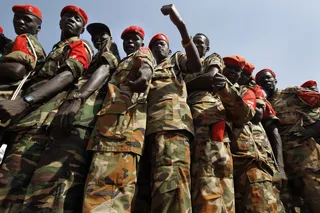FAQ: Sudan Independence
Get key facts on South Sudan’s independence.

1 / 9
Independence Day - Following decades of civil war, Africa's Southern Sudan is set to break off from the rest of Sudan to become its own independent nation on Saturday, July 9. Get background on the bloody conflict that has left more than two million people dead, as well as details about the new government in the following pages.(Photo: AP Photo/Pete Muller)

2 / 9
What Was the Cause of Division in the Nation? - Sudan, a nation that gained independence from Egypt and the United Kingdom in 1956, is split between a mostly Arab and Muslim north and a mostly African South. The conflict, historically, has been due to northerners attempting to unify the nation using Islam and Arabism, much to the displeasure of those in the south. Southerners also accuse the northern-controlled government of discriminating against them. As a result of leaders from the Arab north attempting to push their agenda, civil strife between the two sides often occurred throughout the years.(Photo: AP Photo/Pete Muller)

3 / 9
Darfur Conflict - In 2003, two rebel groups in Darfur--the Sudan Liberation Army and the Justice For Equality Movement--believed the government was oppressing Black Africans and stepped up their attacks against government troops. This resulted in government-sanctioned air raids as well as vicious attacks, including rape and murder by the notorious Arab Janjaweed militia, in the Darfur region.(Photo: LUC GNAGO/Reuters /Landov)

4 / 9
How Were the People of Darfur Affected? - The conflict devastated the Darfur region. At least 300,000 people lost their lives due to fighting and disease, while 2.7 million people were forced to flee their homes, causing a severe humanitarian crisis. Aid groups and the U.S. said the killings amounted to genocide. But the Sudanese government insists the figures are being exaggerated, with President Omar al-Bashir claiming that only 10,000 died due to the conflict.(Photo: REUTERS/Stuart Price/AMIS/Handout (SUDAN)

5 / 9
How are the Darfur Conflict and the Conflict in Southern Sudan Similar? - The Darfur conflict and the Southern Sudan conflicts are similar in that both feature historically marginalized groups (Black Africans) fighting the government for a greater share of resources.(Photo: AP Photo/Jerome Delay, file)
Photo By Photo: AP Photo/Jerome Delay
ADVERTISEMENT

6 / 9
Is the War Now Over? - In 2005, Sudan People's Liberation Movement and the government of Sudan signed a peace agreement, which many in the international community hoped would bring an end to fighting. The deal "called for wealth-sharing, power-sharing, and security arrangements between the two parties" in addition to "a ceasefire, withdrawal of troops from southern Sudan, and the repatriation and resettlement of refugees," according to the State Department. However, since not all rebel groups agreed to sign the deal, conflict in the region intensified in 2006. And after years of broken agreements, conflict in the Darfur region still exists.(Photo: Sudanese President Omar al-Bashir , AP Photo/Liu Jin, Pool)

7 / 9
Why is Southern Sudan Going to Be Independent? - In accordance with the Comprehensive Peace Agreement signed in 2005, a referendum was held in January 2011 giving those living in southern Sudan the option of either staying unified with Sudan or separation. Over 97 percent of eligible citizens voted overwhelmingly (98.83 percent) to leave Sudan.(Photo: REUTERS/Andrew Heavens, SUDAN)

8 / 9
Are There Lingering Issues Between the Two Sides? - Issues still not resolved between the two soon-to-be separate nations include: citizenship, debt, oil management, wealth-sharing and currency, according to the State Department. Another huge issue is the status of border town Abyei, where oil has been found. In May 2011, northern forces seized control of the area after three days of fighting. About 20,000 people have fled the region due to the fighting.In this photo released by the United Nations Mission in Sudan (UNMIS), homes are seen burning in the town of Abyei (Photo: AP Photo/UNMIS, Stuart Price)
